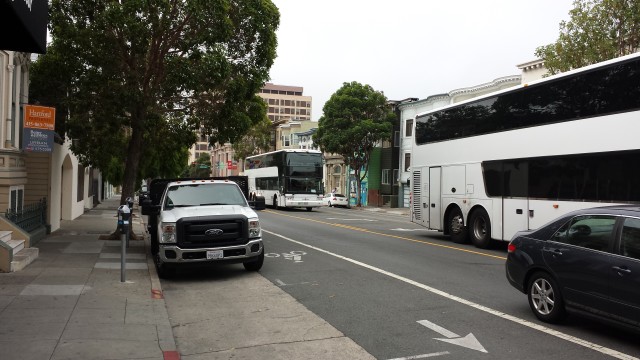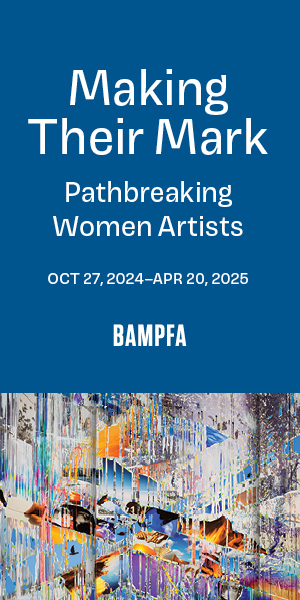As foes of the Google Bus deal take their case to court, a state bill would legalize the privatization of public bus stops

By Sue Vaughan
APRIL 24, 2015 — The crisis that has been disrupting San Francisco housing, and driving out the lower and middle classes for some years now, is moving to another piece of valuable real estate – public bus stops.
Private, for profit corporations have been salivating secretly over these stretches of curbside real estate with such intensity – and secrecy – that you might think there’s gold underneath the pavement.
Did you know, for instance, that on Monday, April 27, the California Assembly Transportation Committee will hear a bill, AB 61, that proposes to essentially give away public bus stops to some of the wealthiest, private, for-profit corporations that the world has ever known?
This giveaway has been ongoing for several years with the assistance of locally elected and appointed officials – but in violation of the California Vehicle Code.
The law
For some years now, private luxury tech shuttles have been operating illegally in public Muni bus stops. The vehicle code is unambiguous: “Under existing law, a person may not stop, park, or leave standing alongside a curb space authorized for the loading or unloading of passengers of a bus engaged as a common carrier in local transportation when indicated by a sign or red paint on the curb, except that existing law allows local authorities to permit schoolbuses to stop alongside these curb spaces upon agreement between a transit system operating buses as common carriers in local transportation and a public school district or private school.”
But in early January 2014, the San Francisco Municipal Transportation Agency quickly cobbled together the Commuter Shuttle Bus Pilot Policy and Program to monitor and regulate the sharing of public bus stops with private, for-profit corporations and carriers.
Five present members of SFMTA Board of Directors, all of whom serve at the pleasure of the mayor, adopted the policy in early 2014, opting to forego an environmental impact report. An environmental impact report could assess all impacts of the system, from air quality (big diesel buses that spend a lot of time idling) to evictions and displacement of middle and lower income people to far flung suburbs where they must drive more frequently and for longer periods of time. Environmental impact reports under the California Environmental Quality Act are also required to include mitigations.
Proponents of the private shuttle bus system argue that they get cars off the road, and the Genentech buses proudly advertise that each bus removes 120 cars. But if only wealthy people can afford to move in and lower-income people are being forced out or prevented from moving in, then only the cars of rich people are being removed from the road. Displaced lower-income people are in all likelihood moving to suburbs less well-served by mass transit.
When the Board of Directors decided against an EIR, the Coalition for Safe, Legal, and Environmental Transit hired a lawyer and appealed that decision to the Board of Supervisors in early April. When the eight out of 10 supervisors present denied the appeal, the coalition sued in court.
The shuttle program officially “started” in August 2014, with a charge per stop event now set at $3.55 per stop per day per bus (not passenger). Per state law, the city can’t charge the buses more than the cost to administer the program. There are about 200 private shuttle buses with permits, operating in about 100 bus stops. There are also 19 “white zones” where the shuttles have exclusive access (at least during commute hours). Supposedly, these private buses are being charged for about 2,500 stops events per day.
The lawsuit lingered for months, with an army of lawyers from Morrison and Foerster, and other blue chip firms, in defense of the real parties to the lawsuit – Google, Apple, Genentech, Bauer’s, and so on – using whatever legal road blocks they could to draw out the lawsuit, perhaps until Mayor Ed Lee presumably is re-elected and/or until the pilot program is completed in January 2016. At which point a permanent program will most likely be considered.
AB 61
Then in late January 2015, coalition members discovered that on December 12, 2014, a Republican Assemblymember from Orange County had introduced legislation to amend the vehicle code to permit the operation of “discrete” private vehicles in public bus stops upon agreement with local transportation authorities. Travis Allen of Huntington Beach specifically mentioned San Francisco in the first sentence of his legislative Fact Sheet.
Coalition members got organized. The following partial list of organizations has come out in opposition to AB 61: California Walks; D5 Action; Gray Panthers of San Francisco; San Francisco Tomorrow; Save Muni; the San Francisco Latino American Democratic Club; Senior and Disability Action; the California Association of Retired Americans; the FDR Democratic Club; the Harvey Milk LGBT Democratic Club; the Potrero Hill Democratic Club; the Richmond District Democratic Club; the San Francisco Green Party; Unite Here Local 2; United Educators of San Francisco; and Upper Noe Valley Neighbors.
The Lawsuit
The lawsuit, meanwhile, has begun. Motions have been filed and heard and trial dates set.
The army of lawyers is making some interesting arguments:
1) That Google, Apple, Genentech, and so on should be dismissed as real parties to the case (because they aren’t? Because they have no real financial interests at stake?);
2) That the introduction of AB 61 is irrelevant; and,
3) That if the city slaps up some signs on some bus stops that the pilot program is perfectly legal.
From the point of view of the plaintiffs, all these arguments appear to be a deliberate misreading of the law.
Regarding the last one, a separate vehicle code regulates signs, but nowhere in that particular part of the vehicle code are there any signs for private carriers operating in public bus stops as a part of a pilot program or authorized private transit system.
The trial on the merits of the vehicle code case will be heard on June 22, and the trial on the merits of the CEQA case will be heard on June 29.
What’s Wrong with This Picture?
Today I was in a high school US History class and got to give a brief refresher course on the progress of civil rights from the 14th Amendment (equal protection under the law) to the Civil Rights Act of 1964 (no discrimination in places of public accommodation) and the Americans with Disability Act (accessibility – bus drivers complain that they cannot pull up to the curb to pick up seniors and people with disabilities when private buses block their way). Private vehicles in public bus stops also slow down Muni and may contribute to documented citywide economic losses due to poor on-time performance.
And then there’s just the plain inequity of the system. Everyone else who pulls into a Muni stop gets dinged $271.
Public transportation in affordable and walkable communities is going to be an essential part of combatting climate change and should now be an essential part of combatting income inequality. Private, for-profit corporations could do a world of good if they took their billions and built workforce housing and helped create a world-class regional transit system available to everybody.
In the meantime, concerned citizens can send an email to stopab61@sonic.net to get the contact information for Travis Allen, and the long list of Assembly Transportation Committee members (and the San Francisco state legislators).


